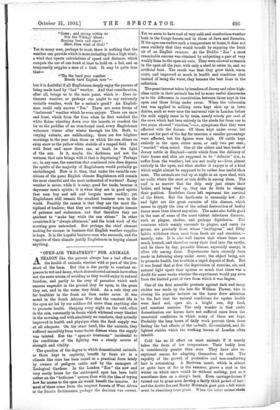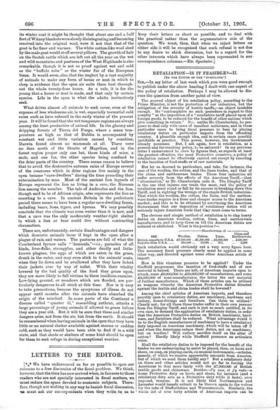A " OPEN-AIR TREATMENT " FOR ANIMALS. SEASON like the present
always has a bad effect on the health of animals, whether wild or part of the live- stock of the farm. But this is due partly to constant ex-
posure to wet and damp, which domesticated animals have often not the same means of avoiding as they would enjoy in natural
freedom, and partly to the crop of parasites which such SWIMS engender in the ground they lie upon, in the grass they eat, and in the water they drink. As a rule they are
far healthier in the fresh air than under cover. It was noted in the South African War that the constant life in the open air led by our soldiers did more than anything else to promote health. Sleeping every night on the veld, often in the rain,. constantly in frosts which whitened every blanket in the morning, and with absolutely no comforts, they actually improved in health and physique when the food supply was . at all adequate. On the other hand, like the animals, they suffered incredibly from water-borne disease when the supply was tainted. But the " open-air treatment" incidental to the conditions of the fighting was a steady source of strength and vitality.
The question of the degree to which domesticated animals, or those kept in captivity, benefit by fresh air in a climate like ours has been raised in a practical form lately hy owners of pedigree, cattle, and by the managers of Zoological Gardens. In the London " Zoo " the new and
very costly house for the anthropoid apes has been built rather on the " hothouse " system than with the idea of trying how far access to the open air would benefit the inmates. As most of -these come from the tropical forests of West Africa or the Straits Settlements, perhaps the decision was correct. Yet we seem to have read of very cold and comfortless weather both in the Congo forests and in those of Java and Sumatra. If the apes can endure such a temperature at home, it does not seem unlikely that they would benefit by enjoying the fresh air of an English summer. At the Dublin " Zoo " a most remarkable success was obtained by subjecting a pair of very weakly lions to the open-air cure. They were allowed to remain in the open all the year, with only a shed to retire to, and no artificial heat. The result was that they grew thick, warm coats, and improved so much in health and condition that instead of being the worst, they became the best lions in the collection.
The greatinterest taken by breeders of Jersey and other high- class cattle in their animals has led to some useful discoveries as to the difference in constitution between those kept in the open and those living under cover. When the tuberculin test was applied to milking cows kept shut up in town dairies, such as were once the universal rule in London before the milk supply came in by train, nearly ninety per cent. of the cows which had been entirely in the sheds for from one to two years showed "reaction,"—i.e., symptoms that they were affected with the disease. Of those kept under cover, bat sent out for part of the day for exercise, a smaller percentage were affected, but the figures were high. Of cattle kept entirely in the open, either none, or only two per cent., " reacted " when tested. One of the oldest and best herds of Jersey cattle in England—cattle which from the delicacy, of their frame and skin are supposed to be " delicate " (i.e., to suffer from the weather), but are not really so—lives almost entirely in the open, and what shelter it enjoys is of a kind which might almost be supposed to be rather less useful than none. The animals are tied up at night in an open shed, with no walls, where the snow or rain drifts in among them. The roof is so narrow that the drip only just clears their bodies, and being tied up, they can do little to change their position. Doubtless those left represent the survival of the fittest. But the death-rate is unusually low. Air and light are the great enemies of this disease, which seems to typify the idea of the actual destruction of bodily tissue more than almost any other. The same also holds good in the case of some of the more violent infectious diseases, such as plague, cholera, and perhaps diphtheria. The creatures which mainly succumb to plague, and carry its germs, are precisely those whose " lucifugous " and filthy habits withdraw them most from fresh air and sunshine,— namely, rats. It is also well known that where foxes are much hunted, and therefore carry their food into the earths. and lie there by day, parasitic disease, especially mange, is often rife among them. Experiments have recently been made in fattening sheep under, cover, the object being, not to promote health, but to obtain a rapid deposit of flesh. But it was found that at first the deprivation of exercise, air, and natural light upset their system so much that there was a doubt for some weeks whether the experiment would pay even from the limited point of view from which it was begun.
One of the first scientific protests against dark and damp stables was made by the late Sir William Flower, who in closing his popular lectures on the horse drew attention to the fact that the natural conditions for equine health were hard soil, open air, a bright sun, dry food, and constant exercise. The only wonder is that under domestication our horses have not suffered more from the unnatural conditions in which many of them are kept. Probably the long hours of daily work prevent them from feeling the bad effects of the ia-built, ill-ventilated, awl ill- lighted stables which the working horses of London often inhabit.
Cold has no ill effect on most animals if it merely takes the form of low temperature. Their bodily heat is considerably greater than ours. They have also ex- ceptional means for adapting themselves to cold. The rapidity of the growth of • protective and non-conducting hair is astonishing. A Bactrian camel, which is almost or quite bare of fur in the summer, grows a coat in the winter on which snow would lie without melting, just as it sometimes does on a sheep's back. Even carriage-horses if turned out to grass soon develop a fairly thick jacket of hair ; and the Arctic fox and Rocky Mountain goat gain a felt which must be absolutely frost-proof. When the latter animal sheds
its winter coat it might be thought that about one and a half feet of Witney blankets were slowly disintegrating and becom ing resolved-into the original wool, were it not that that of the goat is far finer and warmer. The white cotton-like wool shed by the male goat would stuff several pillows. The growth of hair on the Scotch cattle which are left out all the year on the wet and wild mountains and pastures of the West Highlands is also remarkable, though it is not so proof against wet and cold as ;the "buffalo robe" or the winter fur of the European biaon. It would seem, also, that the neglect by a vast majority of animals to make any form of house or nest in which to sleep is evidence that the open air suits them best through- out the whole twenty-four hours. As a rule, it is for the young that a house or nest is made, and that only by certain species. Life in the open is what the adults instinctively seek.
What drives almost all animals to seek cover, even at the expense of less wholesome air, is wet, especially torrential cold rains such as have ushere'd in the early winter of the present year. It will be found that the wet temperate regions are always among the least productive of animal life. In the gloomy and dripping forests of Tierra del Fuego, where a mean tem- perature as high as that of Dublin is accompanied by constant wet and little variation caused by sunshine, Darwin found almost no mammals at all. There were no deer south of the Straits of Magellan, and in the forest region proper only one bat, three kinds of mice, a mole, and one fox, the other species being confined to the drier parts of the country. There seems reason to believe that to avoid the destructive autumn rains of Europe several of the creatures which in drier regions live mainly in the open became "cave-dwellers" during the time preceding their extermination by man. Most of the ancient lion legends of Europe represent the lion as living in a cave, the Numean lion among the number. The tale of Androclus and the lion, though said to be of African origin, also represents the lion as resorting to a cave. In ancient Britain in the prehistoric period there seems to have been a regular cave-dwelling fauna, including bears, lions, tigers, and hyenas. We may possibly conclude that the climate was even wetter than it is now, and that a cave was the only moderately weather-tight shelter in which a lion or bear could live without contracting rheumatism.
There are, unfortunately, certain disadvantages and dangers which domestic animals incur if kept in the open after a plague of rain and waters. The pastures are full of what the Cumberland farmer calls " 'demicals,"—i.e., parasites of all kinds, liver-flue, atrongylus, and other deadly and little- known plagues, the eggs of which are eaten in the grass, drunk in the water, and may even stick to the animals' coats, when they lie down and be swallowed after they have licked their jackets over by way of toilet. With their vitality lowered by the bad quality of the food they graze upon, they are more likely to fall victims to these insidious enemies. Low-lying ground, or meadows which are flooded, are par- ticularly dangerous to all stock at this time. Nor is it easy to take precautions, because the symptoms of illness do not appear until months after the animals have absorbed the origin of the mischief. In some parts of the Continent a disease called " quarter ill," resembling anthrax, attacks a large percentage of young animals if allowed to graze before they are a year old. But it will be seen that these and similar dangers arise, not from the air, but from the earth. It should be remembered when leaving animals in the open that they have little or no natural shelter available against storms or sudden cold, such as they would have been able to find if in a wild state, and that sheds or shelters of some kind should be open for them to seek refuge in during exceptional weather.



















































 Previous page
Previous page